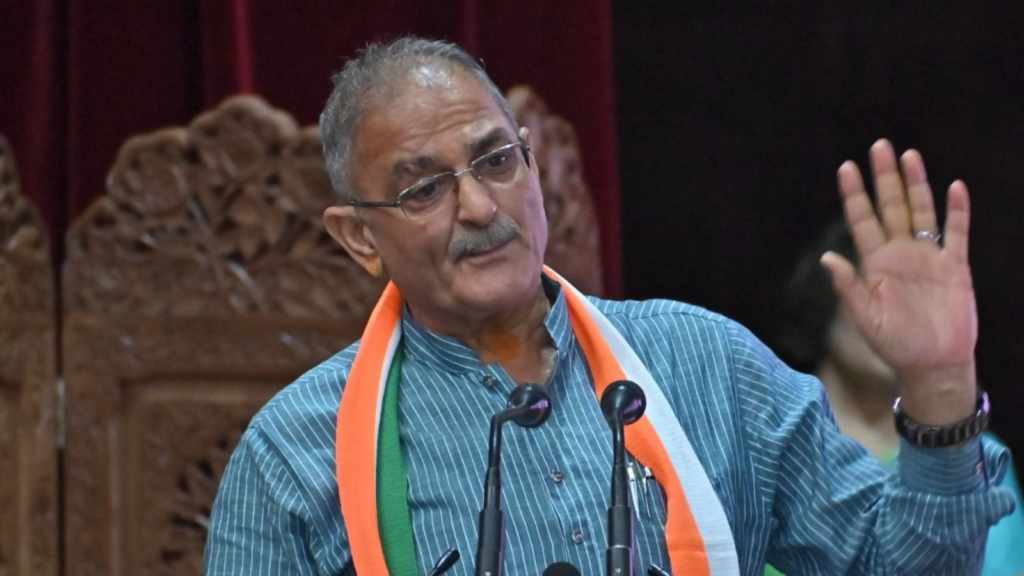JammuJul 16, 2025 10:54 IST
First published on: Jul 16, 2025 at 10:54 IST
Jammu and Kashmir BJP veteran and former deputy chief minister Kavinder Gupta has been appointed the Lieutenant Governor of Ladakh by the Centre Monday. In an interview with The Indian Express, Gupta speaks on a range of issues, from the Union Home Ministry’s “in-principle approval” for formation of five new districts in Ladakh to the demands for statehood and Sixth Schedule for the Union Territory (UT). Excerpts:
*What is your perspective on the current situation in Ladakh?
We all know that there has been continuous discrimination with Ladakh during successive J&K governments and it was due to this discrimination that the people there used to demand a UT and Hill Councils for them. Keeping in view the hardships faced by people in view of their far-off and inaccessible geography, the Central government granted them Hill Councils and later the UT status following reorganisation of the erstwhile J & K state post August 5, 2019.
There had been no degree colleges, universities and adequate health infrastructure in Ladakh. The students had to travel to Jammu to continue their studies. However, after 2014, the BJP government at the Centre has been constantly working to carry forward the agenda of all-round development there. The Home Ministry has approved in principle five new districts taking their total number to seven in Ladakh, but still people there have many demands.
*How do you look at Ladakh as a separate entity from J&K?
You go anywhere and have a look into the history, it is not strange. Once Maharashtra and Gujarat used to be one, Chhattisgarh and Madhya Pradesh were one, and Jharkhand was part of Bihar state. I feel that the pace of development has accelerated after the creation of these new states.
Likewise, Ladakh being a far-off place, the administration of the erstwhile state was not willing to go and stay there. Even its officers did not go there to serve the local people, but they went there only to spend time. Now, with the creation of new districts and Hill Councils, things will move further, leading to a network of roads, improved health infrastructure, education and so on. The day will not be far off when we will take the train also to Ladakh. After August 5, 2019, when the J&K Reorganisation Bill was brought in Parliament and Ladakh was made a separate UT, a new era of development started there.
*How do you see public demands for statehood and constitutional safeguards under Sixth Schedule or job reservation for locals?
This is natural. Such demands arise from Jammu also, although it is a different matter that the development has been much more here after J&K became a UT. We will accelerate the pace of development in Ladakh as well. We only need to sit and talk with the people and convince them. And I believe that things get resolved when there is dialogue. We will maintain that communication. The Central government has recently talked with the representatives of the people of Ladakh on their demands and without studying all these things, it will not only be difficult but also wrong for me to talk about these issues.
*How would you meet public aspirations?
Ladakh has two Hill Councils at present – one at Leh and other in Kargil. While efforts will be made to strengthen them, there will also be more Hill Councils, municipalities and other development authorities with the creation of five more districts. These will make people feel that they too are involved in development. And when we involve people in development, there will be no such thing as discontentment. Earlier, there were only four MLAs in Ladakh – one each from Leh, Kargil, Nubra and Zanskar. I have seen them closely first as Speaker of the Assembly and later as Deputy CM of the then J&K state. Their number was not sufficient enough to do something for the development of the region. Now when there will be public representatives everywhere after the creation of more Hill Councils, municipalities etc., things will further improve.
*What are the challenges in Ladakh?
Some are related to defence which do not fall within the domain of the civil administration. However, in view of the region sharing its borders with China on one hand and Pakistan on the other, there is a requirement of a road which remains open for vehicular traffic for all the 12 months to ensure its connectivity with the rest of India round the year. For this, Prime Minister Narendra Modi had laid the foundation stone of Zojila tunnel in 2018. The foundation stone of Z-Morh tunnel near Sonamarg was laid in October 2012, but the work on it started in 2015. These tunnels are almost complete and like Kashmir, where we have set a travel time of six hours between Jammu and Srinagar, we would like to have a frequent road travel facility to Ladakh as well.
*What is your message for the Ladakh people?
I am coming for your (Ladakh people) welfare. The duty I have been entrusted by the President, Prime Minister, Home Minister and the BJP leadership is for the development of Ladakh. I will try to carry forward Ladakh’s development, keeping in mind the aspirations and thinking of its people. We will sit together and work unitedly to achieve this goal. My administration will work in coordination with the people of Ladakh.




